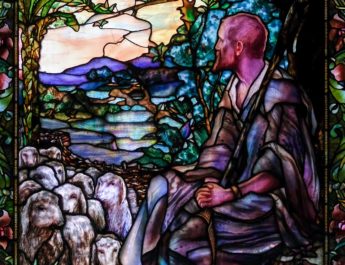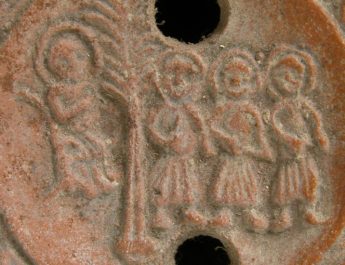1 Samuel 1:19-28
A Women’s Lectionary 4
19 They rose earlyA in the morningB and worshipedC beforeD the Lord;E
A “rose early” = shakam. This is leaning one’s shoulder into a burden or load, whether a person or an animal. Thus, it meant starting or rising early.
B “morning” = boqer. From baqar (to seek, plow, break forth, admire, care for). This refers to the break of day. So it is dawn, early, morning, or morrow.
C “worshiped” = shachah. This is to bow down, make a humble entreaty, to do homage to royalty or to God.
D “before” = paneh. From panah (to turn, face, appear). This is face in a literal or figurative sense. It could be face, presence, anger, respect. It can also be used of God to indicate divine favor or presence.
E “Lord” = YHVH. From havah (to be, become) or hayah (to come to pass, become, be). This is the name of the God of Israel, the self-existent and eternal one, the tetragrammaton. This pronunciation has been lost to time so “Lord” is generally used in its place.
then they went backF to their houseG at Ramah.H
F “went back” = shub + bo. Shub is to turn back, return, turn away – literally or figuratively. Doesn’t necessarily imply going back to where you started from. This is also the root verb for the Hebrew word for repentance “teshubah.” Bo is to enter, come in, advance, fulfill, bring offerings, enter to worship, attack. It can also have a sexual connotation.
G “house” = bayit. Probably from banah (to build, make, set up, obtain children; to build literally or figuratively). This is house, court, family, palace, temple.
H “Ramah” = Ramah. From rum (to be high, rise, exalt self, extol, be haughty; to rise literally or figuratively). This is Ramah, meaning height.
ElkanahI knewJ his wifeK Hannah,L and the Lord rememberedM her.
I “Elkanah” = Elqanah. From el (God, a god) + qanah (to get, buy, redeem, create, possess). This is Elkanah, a name meaning “God has created, “God has taken possession,” “God has redeemed,” or “God has obtained.” See https://www.abarim-publications.com/Meaning/Elkanah.html
J “knew” = yada. This is to know, acknowledge, advise, answer, be aware, be acquainted with. Properly, this is to figure something out by seeing. It includes ideas of observation, recognition, and care about something. It can be used causatively for instruction, designation, and punishment.
K “wife” = ishshah. From ish (man); perhaps from enosh (human, humankind, mortal); from anash (to be weak, sick, or frail). This is woman, wife, or female.
L “Hannah” = Channah. 13x in OT. From chanan (beseech, show favor, be gracious; properly, to bend in kindness to someone with less status). This is Hannah or Channah, meaning “favored.”
M “remembered” = zakar. This is to remember, to mark something so that it can be recalled, to be mindful of, to mention.
20 NIn dueO timeP Hannah conceivedQ and boreR a son.S
N {untranslated} = hayah. Related to “Lord” in v19. See note E above.
O “due” = tequphah. 4x in OT. Perhaps from naqaph (to strike, cut down, surround, destroy, corrode, knock together, or enclose; to surround as a guard or like the sea; coming to the end of a festival time or enclosing in a net or trap). This is a revolution, circuit, end, a passage of time.
P “time” = yom. Root may mean being hot. This is the day in a literal or figurative sense. It can also mean birth, age, daylight, continually or other references to time.
Q “conceived” = harah. This is to conceive or be pregnant – it can be literal or figurative.
R “bore” = yalad. This is to bear or bring forth. It can mean to act as midwife or to show one’s lineage. This is often used for birth or begetting.
S “son” = ben. Related to “house” in v19. From banah (see note G above). This is son, age, child. It is son in a literal or figurative sense.
She namedT him Samuel,U for she said, “I have askedV him of the Lord.”
T “named” = qara + shem. Literally, “called his name.” Qara is to call or call out – to call someone by name. Also used more broadly for calling forth. Shem may be from sum (to put, place, set). This is name, fame, renown. A name was thought to indicate something essential about a person – something about their individuality. So, this word can also mean honor, authority, or character.
U “Samuel” = Shemuel. Related to “Elkanah” in v19 & “named” in v20. From shem (see note T above)} + el (see note I above) OR from shama (hear, call, consent, or consider; implies listening intelligently, giving attention; obedience and action are often implied) + el (see note I above). This is Samuel meaning either the “name of God” or “heard of God.”
V “asked” = shaal. This is to ask, inquire, beg, borrow, desire, request. It can also mean to demand.
21 The manW Elkanah and allX his householdY went upZ to offerAA to the Lord the yearlyBB sacrifice,CC and to pay his vow.DD
W “man” = ish. Related to “wife” in v19. See note K above.
X “all” = kol. From kalal (to complete). This is all or every.
Y “household” = bayit. Same as “house” in v19. See note G above.
Z “went up” = alah. This is to go up, approach, ascend, be high, be a priority; to arise in a literal or figurative sense.
AA “offer” = zabach. This is slaughtering an animal, generally for the purpose of sacrifice. It can mean kill or offer.
BB “yearly” = yom. Same as “time” in v20. See note P above.
CC “sacrifice” = zebach. Related to “offer” in v21. From zabach (see note AA above). This is a slaughter – literally of an animal. So, it implies the act or the animals used in sacrifice. Further, it can mean offering.
DD “vow” = neder. From nadar (to vow or promise). This is a vow – literally, that which was promised.
22 But Hannah did not go up, for she said to her husband,EE “As soon as the childFF is weaned,GG I will bringHH him,
EE “husband” = ish. Same as “man” in v21. See note W above.
FF “child” = naar. May be from na’ar (to shake, toss up and down, tumble around). This is a child or a servant. It is a child in their active years so they could be aged anywhere from infancy to adolescence.
GG “is weaned” = gamal. This is how one deals with someone whether positively or negatively – so to reward, requite. It can also mean to wean or the work that goes into something ripening.
HH “bring” = bo. Same as “went back” in v19. See note F above.
that he may appearII in the presenceJJ of the Lord, and remainKK there forever;LL I will offer him as a nazirite for all time.”MM
II “appear” = raah. This is to see in a literal or figurative sense so stare, advise, think, view.
JJ “presence” = paneh. Same as “before” in v19. See note D above.
KK “remain” = yashab. This is to sit and so to remain and so to dwell. It is sitting for any reason – as a judge, in order to ambush, or just sitting quietly. Causatively, this can mean settling or marrying. This can also mean continue, endure, or establish.
LL “forever” = ad + olam. Literally, “even to eternity.” Olam is a long scope of time whether in the past (antiquity, ancient time) or in the future (eternal, everlasting).
MM “I will offer him as a nazirite for all time” is not in the Masoretic text.
23 Her husband Elkanah said to her, “DoNN what seems bestOO to you,PP waitQQ until you have weaned him;
NN “do” = asah. This is to make, do, act, appoint, become in many senses.
OO “best” = tob. From tob (to be pleasing, to be good). This is good, beautiful, pleasant, agreeable, bountiful, at ease. This word is used for goodness as a concept, a good thing, a good person. This can refer to prosperity and welfare as well as joy, kindness, sweetness, and graciousness. So, this is ethically good, but also enjoyably good.
PP “you” = ayin. Literally, “in your sight.” This is eye in a literal or figurative sense so eye, appearance, favor, or a fountain (the eye of the landscape).
QQ “wait” = yashab. Same as “remain” in v22. See note KK above.
only—may the Lord establishRR his word.”SS So the womanTT remained and nursedUU her son, until she weaned him. 24 When she had weaned him, she took him upVV with her, along with a threeWW-year-old bull,XX
RR “establish” = qum. To arise, stand, accomplish, establish, abide. This is rising as in rising against, getting up after being sick or asleep, arising from one state to another, becoming powerful, or rising for action. It can also be standing in a figurative sense.
SS “word” = dabar. From dabar (to speak, declare, discuss). This is speech, a word, a matter, an affair, charge, command, message, promise, purpose, report, request. It is a word, which implies things that are spoken of in a wide sense.
TT “woman” = ishshah. Same as “wife” in v19. See note K above.
UU “nursed” = yanaq. This is to suckle or to nurse. In a causative sense, it can mean to give milk. So, this word can be used for a nursing mother or for her suckling child.
VV “took…up” = alah. Same as “went up” in v21. See note Z above.
WW “three” = shalosh. This is three, fork, three times.
XX “bull” = par. Perhaps related to parar (to break, defeat, frustrate, caste off, clean, cease). This is a young bull or ox.
anYY ephahZZ of flour,AAA and a skinBBB of wine.CCC
YY “an” = echad. Perhaps from achad (to unify, continue on a path; figuratively, to gather one’s thoughts). This is the number one, first, united. It can also be alone, altogether, a certain, a few.
ZZ “ephah” = ephah. Perhaps from Egptian ipet (“a dry measure of volume equivalent to…about 19.2 litres”). This is an ephah – specifically, a measure for flour or grain. It can also be used ore generally to refer to a measure. See https://en.wiktionary.org/wiki/jpt#Egyptian
AAA “flour” = qemach. 15x in OT. Root perhaps meaning to grind. This is something ground, such as flour, meal, or grain.
BBB “skin” = nebel. From nabel (to fall away, faint, wither, languish, sink; figuratively, being senseless, foolish, or wicked; to despise, disgrace, or fall to nothing, to be seen with contempt). This is a vessel, perhaps made of skins for holding liquids. It could be a skin, vase, or lyre as having a similar shape.
CCC “wine” = yayin. Root may mean to effervesce, referring to the fermentation process. This is wine, grape, or banquet. It can imply intoxication.
She brought him to the house of the Lord at Shiloh;DDD and the child was young.EEE 25 Then they slaughteredFFF the bull, and they brought the child to Eli.GGG
DDD “Shiloh” = Shiloh. From shalah (to draw out, take away, require) OR from the same as Shiyloh (Shiloh; perhaps “he whose it is” or “tranquil”); perhaps from shalah (to be quiet, safe, tranquil; can imply success or happiness; could also mean to deceive or be negligent). This is Shiloh, perhaps “he whose it is” or “tranquil.”
EEE “young” = naar. Same as “child” in v22. See note FF above.
FFF “slaughtered” = shachat. This is to slaughter, slay, or beat. It can be slaying for a sacrifice or in a massacre.
GGG “Eli” = Eli. Related to “went up” in v21. From alah (see note Z above). This is Eli, meaning “lofty.”
26 And she said, “Oh,HHH my lord!III As youJJJ live,KKK my lord,LLL
HHH “oh” = biy. 12x in OT. Perhaps from ba’ah (to inquire, search, boil, or swell out. Figuratively, it could be to sincerely desire). This is O, I pray – it is used to make a request or to speak to someone of higher social status. It is always followed by, “my lord.” In the Bible it is used in addressing a higher status human, an angel, and also God.
III “lord” = adon. From a root that means ruling or being sovereign. This is lord, master, or owner.
JJJ “you” = nephesh. Related to naphash (to refresh or be refreshed). This is soul, self, person, emotion. It is a breathing creature. Can also refer to appetites and desires.
KKK “live” = chay. From chayah (to live or keep alive literally or figuratively). This is alive, living, lifetime. It can also be used to describe someone’s age. It can refer to animals, plants, water, or a company or congregation of people. It is life in a very broad sense.
LLL “lord” = adon. Same as “lord” in v26. See note III above.
I am the woman who was standingMMM here in your presence, prayingNNN to the Lord.OOO 27 For this child I prayed; and the LordPPP has grantedQQQ me the petitionRRR that I madeSSS to him.
MMM “standing” = natsab. This is to station, appoint, establish, take a stand.
NNN “praying” = palal. This is to judge for oneself or in an official capacity. It can also mean to pray or make supplication, to entreat.
OOO “Lord” = YHVH. Same as “Lord” in v19. See note E above.
PPP “Lord” = YHVH. Same as “Lord” in v19. See note E above.
QQQ “granted” = natan. This is to give, put, set, offer. It is to give literally or figuratively.
RRR “petition” = sheelah. Related to “asked” in v20. 14x in OT. From shaal (see note V above). This is something that is requested like a petition, request, or loan. Used frequently in the book of Esther.
SSS “made” = shaal. Same as “asked” in v20. See note V above.
28 Therefore I have lentTTT him to the Lord;UUU as long as he lives,VVV he is givenWWW to the Lord.”XXX
She leftYYY him there for the Lord.ZZZ
TTT “lent” = shaal. Same as “asked” in v20. See note V above.
UUU “Lord” = YHVH. Same as “Lord” in v19. See note E above.
VVV “as long as he lives” = kol + yom + hayah + hu. Literally, “all days has he.” Kol is the same as “all” in v21. See note X above. Yom is the same as “time” in v20. See note P above.
WWW “given” = shaal. Same as “asked” in v20. See note V above.
XXX “Lord” = YHVH. Same as “Lord” in v19. See note E above.
YYY “left” = shachah. Same as “worshiped” in v19. See note C above.
ZZZ “Lord” = YHVH. Same as “Lord” in v19. See note E above.
Image credit: “We belong together, forever, and ever…” by Korz 19, 2010.




